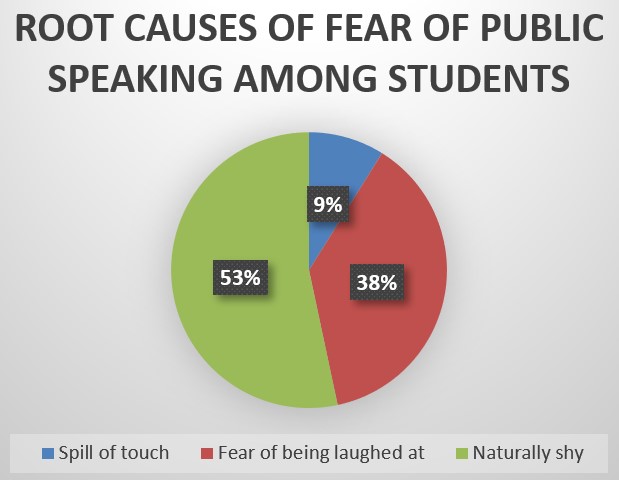Glossophobia: The Fear of Public Speaking in ESL Students in Ghana
Abstract
Glossophobia, an individual’s anxiety of public speaking, has been observed to be a common phenomenon among students. The present study explores factors associated with glossophobia among ESL students of a tertiary institution in Upper-West Ghana, the Dr. Hilla Limann Technical University, Wa and makes recommendations for improvement in their public speaking skills. The study combined both quantitative and qualitative research approaches in an opinion poll involving 46 participants from the Level 300 class of the Secretaryship and Management Studies of the Business School. Participants acknowledged the importance of public speaking, but conceded that at some point in their student lives, when they had to speak in public, glossophobia prevented them from making a good impression on the audience. Speaking English before a crowd was identified as the most dreaded experience. Low self-confidence in speaking in public; lack of constant speaking experience and lack of knowledge in public speaking; fear of making mistakes and being laughed at; inadequate preparation and timidity were also identified as challenges affecting participants’ ability to speak English in public. To help students overcome that phobia, the study recommends that lecturers should adopt an interactive approach combined with the appropriate communication strategies to promote positive attitudes and create the desirable atmosphere for boosting students’ confidence. Lecturers should also organise seminars on public speaking skills and encourage regular individual oral presentation in class so students can practise to develop positive attitudes towards public speaking.
Downloads
References
Bailey, K. M. (2012). Practical English language teaching speaking. New York, Mc Graw-Hill.
Barnard, D. (2017). The importance of eye contact during a presentation. Retrieved 23/01/21 from http://www.virtualspeech.com
Beebe, S., & Beebe, S. (2021). Public speaking: An audience-centred approach. 11th Edn. Pearson. ISBN-13: 9780135729151. Retrieved 14/01/21 from http://www.pearson.com
Black, R. (2019). Glossophobia (Fear of public speaking): Are you glossophobic? Retrieved 23/01/21 from http://www.psycom.net
Bob Jones University (BJU). (1991). Fundamentals of Speech. Greenville: BJU Press.
Bress, P. (2006). Meeting Objectives, English Teaching Professional. July, (45), 14-15.
Brown, H. D. (2002). Strategies for success: A practical guide to learning English. New York, Longman.
Cherrry, K. (2012). The four styles of parenting. Retrieved 03/01/21 from http://www.psychology.about.com/od/developmentalpsychology/a/parenting-style.htm
Christensen, J. P. (2002). Understanding and conducting a successful presentation assignment. Guidelines, 24(2), 23-28.
Chu, C. W. L. (2001). Reflective assessment materials for ELT teachers. The English Teacher, 4(3), 243-251.
Croston, G. (2012). Psychology Today. The thing we fear more than death: Why predators are responsible for our fear of public speaking. Retrieved 01/01/21 from https://www.psychologytoday.com/us/blog/the-real-story-risk/201211/the-thing-we-fear- more-death
Crystal, D. (2003). English as a Global Language. 2nd Ed. Cambridge: Cambridge University Press. https://doi.org/10.1017/CBO9780511486999
Dansieh, S. A. (2015). Quality Issues in Teaching and Learning English at Tertiary Level in Ghana. A thesis submitted for the degree of Doctor of Business Administration. Bath: University of Bath.
Djane, A. (2014). What happened to our youth? New African Magazine. Retrieved 01/01/21 from https://newafricanmagazine.com/6148/
Du Plooy-Cillier, F., & Louw, F. M. (2014). Let’s talk about interpersonal communication. 1st Ed. Cape Town: Pearson Education.
Encyclopedia.com (2021). Speaking. The Oxford Pocket Dictionary of Current English. Retrieved 26/02/21 from https://www.encyclopedia.com/humanities/dictionaries-thesauruses-pictures-and-press-releases/speaking
Fish, B. (2001). In “Do you suffer from glossophobia?” Retrieved 01/01/21from http://www.glossophobia.com/
Fulton, Robert Irving. (2011). College Courses in Public Speaking. The English Journal, 3.3(1914), 160-165. JSTOR. Web. 22 September 2011. https://doi.org/10.2307/801489
Gallo, C. (2006). The 10 worst presentation habits. BusinessWeek.com. Retrieved December 7, 2017 from http://images.businessweek.com/ss/06/02/mistakes/index_01.htm
Genard, G. (2019). Speak for Success: 10 causes of speech anxiety that create fear of public speaking. Retrieved 11/01/21from http://www.genardmethod.com
Hadfield, J., & Charles (2008). Introduction to teaching English. Oxford University Press. Eigal S. A. Portugal.
Harmer, J. (2007). How to teach English. Pearson Education Limited. Essex, England. https://doi.org/10.1093/elt/ccn029
Harmer, J. (2007). The Practice of English Language Teaching. Pearson Education. Limited. Essex, England.
Hashemi, M. (2011). Language stress and anxiety among the English language learners. Procedia – Social and Behavioral Sciences, 30(2011), 1811-1816. https://doi.org/10.1016/j.sbspro.2011.10.349
Hindo, Cindy S., & González-Prendes, A. Antonio. (2011). One-Session Exposure Treatment for Social Anxiety with Specific Fear of Public Speaking. Research on Social Work Practice, 21.5(2011), 528-538. SAGE Publication.Web. 22 September 2011. https://doi.org/10.1177/1049731510393984
Hornby, A. S. (2005). Oxford Advanced Learner’s Dictionary. Oxford University Press. China.
Hyland, K. (2006). English for Academic Purposes: An Advanced Resource Book. London: Routleddge. https://doi.org/10.4324/9780203006603
Johnston, J. E. (2006). The complete idiot’s guide to controlling anxiety. Indianapolis: Alpha Books.
Kankam, P. K., & Boateng, S. O. (2017). Addressing the problem of speech anxiety among students. International Journal of Public Leadership, 13(1), 26-39. https://doi.org/10.1108/IJPL-07-2016-0029
Koshy, B. (2020). Xenoglossophobia among second language learners. International Journal of Creative Research Thought, 8(2). ISSN: 2320-2882. Retrieved 20/04/21 from http://www.ijcrt.org
Krannich, C. R. (2004). 101 Secrets of highly effective speakers: Controlling fear, commanding attention [Recorded by B. McDonald]. [CD]. New York: Listen & Live Audio, Inc.
Kushner, M. (2004). Public Speaking For Dummies. (2nd ed.), New Jersey, USA, John Wiley & Sons.
Liu, Meihua.(2011). Anxiety in Oral English Classrooms: A Case Study in China. Indonesian Journal of English Language Teaching, 3.1(2007a), 119-137. Google Scholar. Wed. 11 November 2011. https://doi.org/10.1057/9780230299481_6
Louise Katz Ph.d (2000). public speaking anxiety, University of Tennessee at martin counseling and career services.
Lumen Learning. (2017). Speech anxiety: Fundamentals of Public Speaking. Retrieved 27/01/21 from http://www.courses.lumenlearning.com
MacIntyre, P. D., & Gardner, R. C. (1994). The subtle effects of language anxiety on cognitive processing in the second language. Language Learning, 44(2), 283-305. https://doi.org/10.1111/j.1467-1770.1994.tb01103.x
McCroskey, J. C. (2001). An introduction to rhetorical communication. Boston, MA: Alyn and Bacon.
O’Neil, D. (2006). What Is Culture. Human Culture: An Introduction to the Characteristics of Culture and the Methods used by Anthropologists to Study It. Retrieved 01/01/21 from http://anthro.palomar.edu/culture/culture_1.htm
Parvis, L. F. (2001). The importance of communication and public-speaking skills. Journal of Environmental Health, 63, pp. 44, 35.
Present Glossophobia.com (2001). Do you suffer from glossophobia? Retrieved 01/01/21 from http://www.glossophobia.com/
Scovel, T. (1991). The effect and affect on foreign language learning: A review of anxiety research. in E.K. Horwitz and D.J. Young, Language Anxiety, 101-108. Englewood Cliffs, NJ: Prentice Hall.
Segar, G. (2018). Types of public speaking anxiety. Retrieved 22/01/21 from http://www.potentspeaking.com
University of Minnesota Libraries. (2011). Stand up, speak out. University of Minnesota Libraries Publishing. Retrieved from http://www.ssrebus.community


This work is licensed under a Creative Commons Attribution 4.0 International License.
Copyright for this article is retained by the author(s), with first publication rights granted to the journal.
This is an open-access article distributed under the terms and conditions of the Creative Commons Attribution license (http://creativecommons.org/licenses/by/4.0/).























